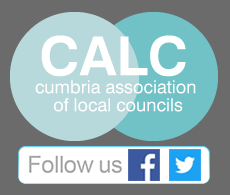Parish Council Clerks

The role of Clerk is to ensure that the Council as a whole conducts its business properly and to provide independent, objective and professional advice and support.
Parish Councils are part of local government in Cumbria together with Cumbria County Council and six District/ Borough councils.
The County Council is responsible for strategic services such as highways, education, libraries social services, strategic planning and refuse disposal.
District councils are responsible for local services including housing, local planning and refuse collection.
The Parish and Town councils in the county are often viewed as the part of government closest to the people. They are the only local government tier that represents residents at parish level.
Importantly Parish Councils can "precept" - raising a council tax each year to improve facilities and services for local people.
Their powers and duties cover many things that we take for granted in making for comfort and well being where we live. These include the provision and maintenance of allotments, burial grounds and public monuments, public clocks, halls, some street lighting, litter bins, car parks, public lavatories, rights of way, roadside verges, bus shelters, swimming pools and village greens.
Parish Councils also comment on planning applications and can be represented at public inquiries.
Similarly they advise the County and District authorities on the views of residents, and especially priorities for local investment.
All Parish Council meetings are open to the public. They are led by the Council's Chairman and advised by a Clerk who is there to see that business is conducted within the law.
A job description will always list the duties in detail but here's a useful summary:
- ensures that the council conducts its business lawfully
- administers all the council's paperwork
- ensures that meeting papers are properly prepared and the public is aware of meeting times
- implements the council's decisions
- oversees the implementation of projects
- supervises staff (if any)
- keeps property registers and other legal documents
- keeps up to date by training /qualification
Sounds pretty daunting doesn't it! - but like everything else in life once you know how then its all fairly straight forward and a very rewarding role.
It is important to understand however that being a Clerk to a Parish or Town Council is a job not a spare time activity - even if it takes only a few hours each week to do.
The job is no different from large to small councils. What is different however is the amount of time needed to deal with the volume of business. For small parishes this need be only a few hours each week while for the larger councils it could be a full time commitment.
Most council meetings are held 'out of hours' so being a part time clerk is not just a daytime activity.
What about training?
Soon after taking up post you will be expected to attend an Induction Course where you can meet other new clerks and start to get answers to the many questions you will have. We hope you will then go on to complete the nationally recognised Certificate in Local Council Administration (CiLCA). Further opportunities include structured training and study, leading, if you choose, to degree level qualification.
Pay and Conditions
Most councils operate nationally recognised rates. You should expect-
- A clear job description
- A contract of employment
- Pay in accordance with national rates for the size of council
Skills and attributes needed
Clerks usually pride themselves in having a good deal of common sense, confi dence to handle the administrative work, being a good organiser, IT literate and able to get on with most people. Underwriting these qualities is a sense of public duty - of wanting to help others in the community.
I'm still interested - what do I do next!
Look out for advertisements for Clerks appointments in your area or on this website. (http://www.calc.org.uk/about/jobs.asp)
Go along to parish council meetings to see how things are done, talk to clerks and councillors about the role.
The Cumbria Association of Local Councils (CALC) is also available to help - ring us on 01768 812663 or email: office@calc.org.uk
